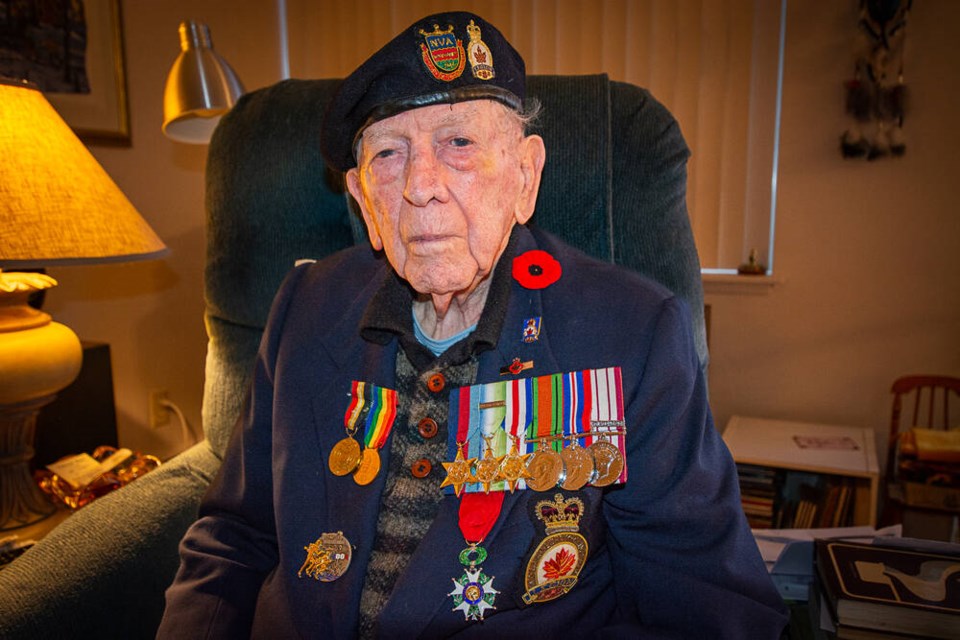Eighty years after Allied forces stormed the beaches of Normandy, France, images of the invasion still flash through Harry Greenwood’s mind like the flashes of a signal lamp.
Aboard HMS Jaunty, a rescue tug, Greenwood – who now lives in West Â鶹´«Ã½Ó³»– was assigned to the first wave of D-Day landings on June 6, 1944.
Opening and closing the shutters of the ship’s signal lamp, the 19-year-old communicated with other vessels and operations on the shore via a code that changed daily to avoid enemy detection.
The task of the Jaunty and other rescue tugs in the Second World War was to save the crews from damaged craft, and tow those ships away when possible.
“The beach master will signal: ‘HMS Jaunty assistance required at Juno [Beach], such and such a point,” he said. “That meant that we were going up there because a ship had been sunk.
“So we go over there to try and get them out of the water, and try and get them back to land.”
Even after all this time, Greenwood can’t bring himself to recount much of what he witnessed that day.
“Because I’ll just cry,” he said. “I was watching them just die, suffering in fuel and oil, and stuff like that.”
While he and thousands of other veterans are remembered for their valour that day, Greenwood remembers chaos.
“Every person had his own story because every person can only see what he was involved in,” he said. “The guy who’s coming off the beach, off the top of the craft and jumping into the water with a gun and running up on the beach – all he sees is a beach.
“He’s not caring about who’s beside, about who’s in front of him, or what the hell is happening. All he says is, ‘I’m getting the hell out of here.’ And that’s everybody’s idea. Get to your point of safety,” Greenwood said.
As the battle to invade German-occupied France raged in the sea and on land, the fight thrummed through the sky as well. In particular, waves of gliders – filled with troopers and heavy weapons – were towed in by warplanes and released above Normandy.
“That was murder,” Greenwood said. “Half of them were killed, because the gliders just hit the ground and disintegrated.”
One of the biggest screw ups that day was the decision to paint Allied planes with black and white stripes, the veteran said.
“That was for identification, but they didn’t tell us – so we were shooting at them,” mistaking them for German planes, Greenwood said.
Greenwood immigrates to Canada, becomes outstanding citizen in West Vancouver
After remaining off the coast of France until November that year, the Jaunty returned to escort and rescue missions in the North Atlantic. Greenwood would continue to sail with the Jaunty in South East Asia following Victory in Europe Day in May 1945 before being discharged from service and returning to his native Scotland.
But coming home wasn’t the welcoming jubilee you might expect. After several visits to offer condolences to families of friends who were lost, Greenwood found he couldn’t continue.
“They look at you as if, ‘What are you doing here? Why aren’t you dead?’” he said. “That’s a hard thing to do, for them to look at you talking about their son, when you look like their son."
“During wartime people don’t realize how it destroys the fabric of society, and breaks up homes and breaks up marriages,” Greenwood said.
The young man studied in Glasgow before immigrating to Canada in 1951. Greenwood first settled in Hamilton, Ont., working as an apprentice machinist and climbing the ranks as a union member.
After retiring in 1992, Greenwood and his wife moved to Squamish to be close to their only daughter. Eventually the couple settled in West Vancouver, where Greenwood has established himself as an exceptional contributor to the community.
For his efforts, which continue today at age 99, he’s earned multiple honours, which include being named Super Trustee by the West Â鶹´«Ã½Ó³»Memorial Library and Citizen of the Year by the West Â鶹´«Ã½Ó³»Chamber of Commerce.
When he moved to B.C., Greenwood became a member of the Royal Canadian Legion, assisting veterans and their families, and holding executive positions within the organization.
Greenwood has also been honoured for his wartime service on numerous occasions, receiving the Legion of Honour Medal from the French government in 2014. He’s travelled to Normandy several times, including the 75th anniversary of the landings on Juno Beach in 2019.
With eight decades to experience and reflect on the cost of war, Greenwood said he gets angry at the flawed diplomacy that leads to more death and destruction today.
“We have a government supporting Israel, with a nation supporting [Palestine]. How do you handle that?” he said. “War is a bad, bad thing and yet we still have idiots that want to go to war.”

